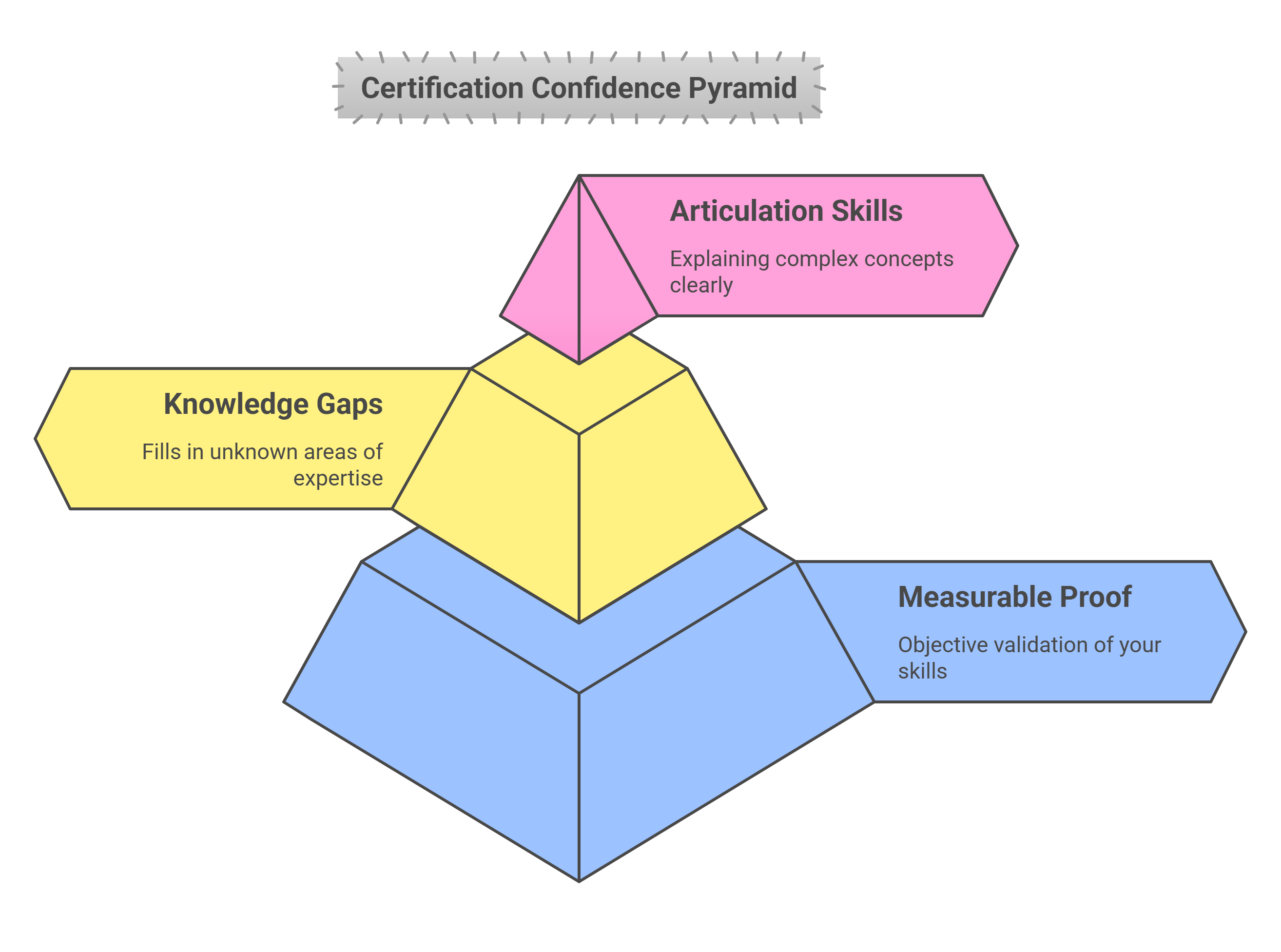
Overcoming Imposter Syndrome: How Certification Can Build Confidence
Have you ever sat at your desk, surrounded by talented colleagues, and thought, "How did I get here? Someone's going to figure out I don't belong"? If so, you're not alone. This nagging self-doubt, known as imposter syndrome, affects countless IT professionals – from fresh-faced junior developers to seasoned system architects.
The Reality of Imposter Syndrome in Tech
Let's be honest: the tech industry moves at lightning speed. One day you're mastering a programming language, and the next, there's a new framework everyone's talking about. This constant evolution can make even the most capable professionals question their expertise.
Sarah Chen, a senior software engineer at a Fortune 500 company, shares her experience:
"Even after five years in the field, I still sometimes feel like I'm just pretending to be a 'real' programmer. The turning point for me was earning my first certification. It gave me concrete proof that I knew what I was doing."

How Certification Fights the Inner Critic
Think of certification as your professional armor against self-doubt. Unlike the subjective feedback we receive in our daily work, certifications provide objective validation of your skills. They're like a trusted friend saying, "Yes, you absolutely know your stuff!"
Here's how certification specifically tackles imposter syndrome:
1. It provides measurable proof of your expertise. When that voice in your head says you're not qualified, you can point to your certification as evidence to the contrary.
2. The structured learning process fills in knowledge gaps you might not have known existed, making you more confident in your comprehensive understanding.
3. Studying for certification forces you to articulate and explain complex concepts – a skill that directly translates to workplace confidence.
Choosing the Right Certification Path
The key is selecting certifications that align with your career goals and current role. Don't fall into the trap of chasing certifications just for the sake of collecting them. Instead, look for ones that validate the skills you use daily or aspire to develop.
For instance, if you're a cloud engineer questioning your AWS expertise, the AWS Certified Solutions Architect certification can provide that external validation you're seeking. Or if you're in cybersecurity, CompTIA Security+ might be your confidence-building stepping stone.
Beyond the Certificate
Remember, certification isn't just about the piece of paper – it's about the journey. The process of studying, practicing, and mastering new concepts builds a foundation of genuine confidence that extends far beyond passing the exam.
As you progress through your certification journey, keep a learning journal. Document your growth, challenges overcome, and moments of breakthrough. This personal record becomes powerful ammunition against future bouts of imposter syndrome.

The Ripple Effect
Interestingly, certification can create a positive feedback loop in your professional life. As your confidence grows, you're more likely to:
Speak up in meetings
Take on challenging projects
Mentor others
Contribute to technical discussions
Each of these actions further reinforces your expertise and gradually silences that inner critic.
Moving Forward
Imposter syndrome doesn't disappear overnight, and that's okay. Think of certification as one powerful tool in your professional development arsenal. Combined with practical experience, peer support, and continuous learning, it forms a robust defense against self-doubt.
Remember: feeling like an imposter doesn't mean you are one. In fact, those feelings often indicate that you're pushing yourself to grow and learn – and that's exactly what great tech professionals do.

Frequently Asked Questions About IT Certification
What exactly is the purpose and value of IT certification?
Professional IT certification serves multiple purposes. At its core, it validates your technical knowledge and skills through standardized testing. Think of it as a third-party stamp of approval that verifies you know what you're doing. The value extends beyond just having credentials – it demonstrates your commitment to professional growth and keeps you current in an ever-evolving industry.
How do IT certifications actually make a difference in my career?
Certifications impact your career in several concrete ways:
They give you a competitive edge in job applications
They often lead to higher salary potential
They demonstrate initiative to current and future employers
They provide structured learning paths for skill development
They help you stay current with industry trends and technologies
Why should organizations care about employee certifications?
Organizations benefit from certified employees in multiple ways. Certified professionals tend to be more efficient, make fewer mistakes, and can mentor other team members. For many organizations, having certified staff also helps win contracts, maintain compliance requirements, and establish credibility with clients. Plus, investing in certification shows a commitment to employee development, which improves retention.
How do certifications specifically lead to better employment opportunities?
Think of certification as a door opener. Many employers use certifications as a screening tool for job candidates. When you're certified, you:
Meet specific job requirements that often list certifications as prerequisites
Stand out in applicant tracking systems that scan for credentials
Have concrete talking points for interviews about your expertise
Demonstrate initiative and dedication to your field
Join professional networks associated with certification programs

Why is it important to maintain IT certifications?
Technology evolves rapidly, and maintaining certifications ensures your knowledge stays current. Regular recertification:
Forces you to stay updated with the latest developments
Shows employers your commitment to professional growth
Helps you identify and fill knowledge gaps
Maintains the validity and credibility of your credentials
Keeps you competitive in the job market
What are the advantages of certification for experienced IT professionals?
Even if you have years of experience, certification provides distinct benefits:
Validates your practical knowledge with industry-recognized credentials
Fills in theoretical gaps that might exist in self-taught skills
Opens doors to leadership and specialized roles
Provides structured learning for new technologies
Reinforces your position as an industry expert
How do I choose which certifications to pursue?
Consider these factors when selecting certifications:
Your current role and desired career path
Industry demand for specific certifications
Your organization's technology stack
Time and cost investment required
Recognition and credibility of the certifying body
Remember that while certifications are valuable, they're most effective when paired with practical experience and soft skills. Choose certifications that align with your career goals and the technologies you're passionate about.
Mike G.
IT Certification Jump
 Add Row
Add Row  Add
Add 
